Most marketers will be familiar with the pain of spending hours sending hundreds of emails manually or sifting through disorganised customer databases.
Yes, these tasks are necessary, but they take up precious time, which you could be spending working on innovative and creative marketing strategies. Luckily, this is where marketing automation comes in.
Say goodbye to tedious hours of manual work and say hello to unleashing the true potential of your marketing strategies!
It’s not surprising that marketers are increasingly turning to marketing automation, as it’s evolved into one of the most powerful tools for automating repetitive tasks and boosting customer engagement.
In this article, we will give you an overview of some of the top marketing automation benefits, the top marketing automation platforms, and tips on how to make the most of marketing automation.
What is Marketing Automation?
Marketing automation is an umbrella term for the software and processes that automate repetitive marketing tasks. It is designed to make marketers’ lives easier by streamlining marketing strategies, reducing time spent on tedious tasks, and maximising the return on investment in marketing.
When a customer signs up for your newsletter, for example, you can create automated drip campaigns to send out personalised emails that target them with highly relevant content at just the right time.
But that’s not the only application. In fact, there’s a wide range of automation tools for different purposes out there, from automating lead generation to tracking user behaviour.
Overall, marketing automation improves the efficiency of your sales funnel while generating more leads. With the help of marketing automation, you can enhance your marketing strategy to bring in qualified leads, increase conversions, and, most importantly, generate more sales.

How Does Marketing Automation Work?
Marketing automation performs repetitive manual tasks so you have more time to focus on the important stuff. With it, scheduled campaigns can be executed at regular intervals. You can get back to creative and cutting-edge marketing while your automated campaigns run in the background.
Here are some automation examples that will streamline your marketing efforts:
- Email campaigns
- Customer segmentation
- Personalised engagement
- Analytics reports for maximising ROI
On top of that, marketing tools such as data warehouses help consolidate your data all in one place, making it far easier to access data, analyse it, report on it, and use it for informed decision-making across departments.
Ultimately, marketing automation puts data to work. Automation tools can send out specific content based on user behaviour and purchase history and trigger cross-channel workflows to guide customers through the sales funnel and nurture prospects into qualified leads.
Marketing Automation for B2B and B2C: What are the Differences?
Both business-to-business (B2B) and business-to-consumer (B2C) companies can benefit from marketing automation.
B2B companies target their sales and services at other businesses, whereas B2C companies sell products and services to consumers, so they slightly differ in the way they use marketing automation software.
B2B marketing automation generates leads to ensure subscribers are engaged throughout sales cycles. On the other hand, B2C marketing automation is more likely to focus on the customer journey and make data-driven suggestions for products and services based on client behaviour.
Moreover, B2B businesses prioritise building one-on-one relationships, whereas B2C focuses on building a consistent brand for a mass audience.

5 Common Types of Marketing Automation Tools
Now that you’re familiar with marketing automation, let’s go over 5 common types of marketing automation tools:
- CRM automation. Although CRM and marketing automation are not the same, CRM can be integrated with marketing automation tools to streamline everyday tasks such as receiving new prospect alerts, storing customer data and generating lead scores. CRM tracks customer interactions across multiple channels, delivers relevant content to a targeted audience and predicts future customer behaviour based on previous interactions.
- Social media management automation. Automation software collects customer data across social media platforms, enabling you to engage with your customers more effectively while keeping an eye on your competitors’ social media activity.
- Email marketing automation. Email automation enables segmentation, personalised emails and drip campaigns, and increases leads as it both engages with and nurtures leads.
- Marketing analytics automation. Optimise future marketing strategies by tracking current campaign metrics and seeing how they are performing. You will have instant access to accurate and data-driven insights into your campaign performance.
- Lead management automation. You can identify significant touchpoints in your sales funnels and nurture leads with targeted messages to prospects based on their customer journey.
Other niche marketing automation tool examples include landing page automation, A/B testing, multi-channel automation, chatbots, etc.
Top 3 Marketing Automation Benefits
As marketers already know, marketing automation has a tremendous positive impact on their campaigns. Here are some of the top marketing benefits:
#1. Saving Time on Menial Tasks
You can automate the majority of marketing tasks, so jobs that used to take hours can now be completed within a matter of seconds.
With a system for automating sending emails, nurturing leads, and scheduling social media posts, you will have more time to focus on creative projects and streamline your marketing process overall.
Furthermore, marketing automation reduces human errors in marketing tasks and eliminates database headaches, such as data silos and confusion between departments, saving you time in the long run.
#2. Improving Your Target Audience
Marketing automation makes it easier to identify your web visitors. And as you will know, turning prospects into qualified leads can be as simple as knowing who your web visitors are.
Marketing automation can track user behaviour and activity within seconds, not only saving you time but also giving you instant insight into what your customers want and how they respond.
Moreover, understanding your customer journey and segmentation will create more personal customer experiences. Marketing automation software helps you be more in touch with your target audience to deliver targeted messages and provide better services and products.

#3. Focusing on High-Level Tasks
Of course, the more time you save, the more time you will have to focus on higher-level tasks. By automating all of those boring tactical tasks, your team can focus on making new campaigns, improving marketing strategies, and working on other strategic projects that will help your brand grow.
Also, marketing automation uses your data to give you a complete picture of your marketing operations and each customer’s journey. By improving insights and leveraging top-notch data, you can develop long-term strategies that focus on the bigger picture.
The benefits of marketing automation are endless; think: great marketing ROI, better quality leads, better lead generation, improved conversion rate, cross-departmental collaboration, more consistent branding, better budget allocation and more!
Top 5 Marketing Automation Tool Examples
Now that we have gone through the top benefits, let’s look at some of the most popular marketing automation platforms in the industry:
#1. MailChimp
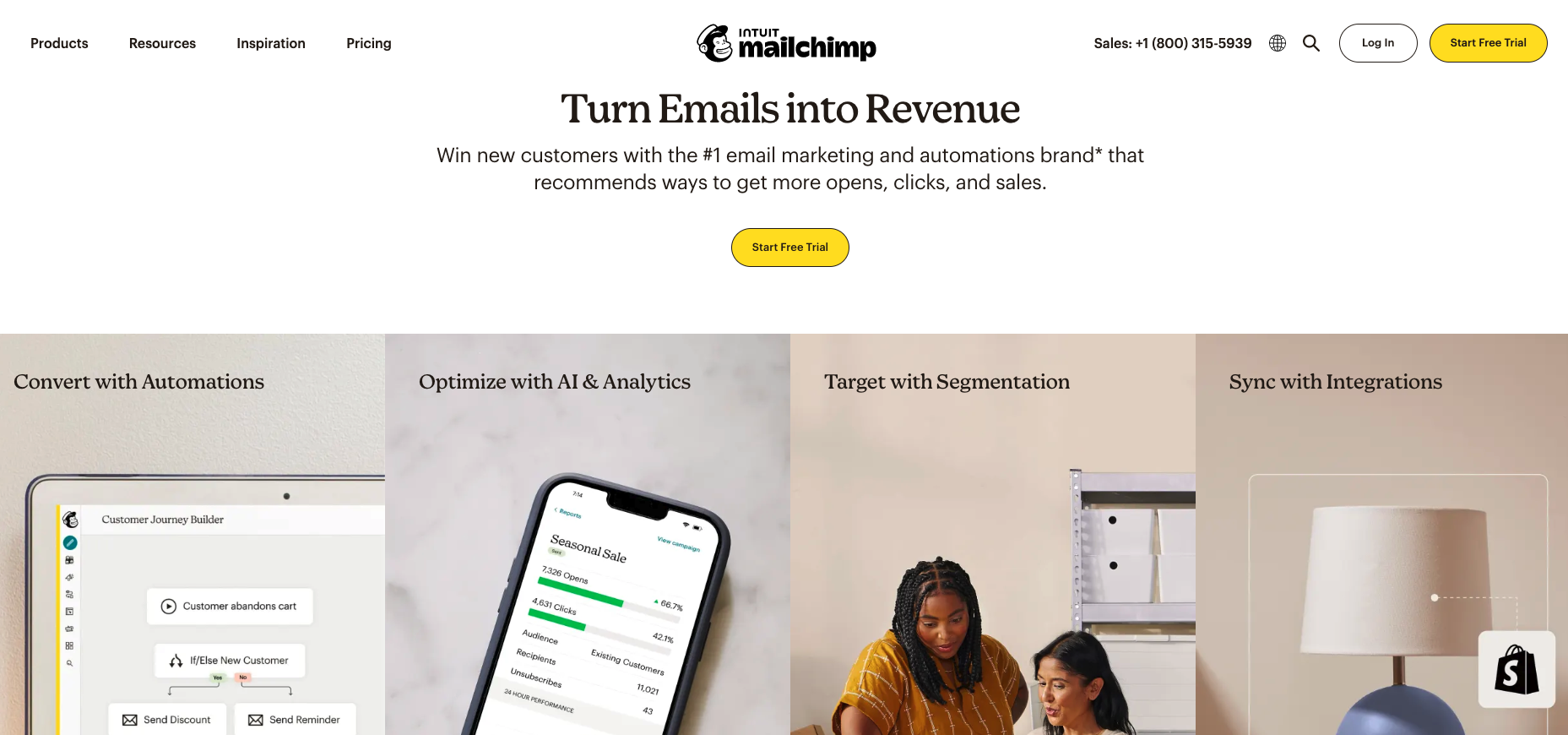
MailChimp specialises in automating email marketing, but it has lots of other tools for all kinds of marketing tasks, such as: customer journey builders that use workflows based on customer interests, transactional email automation, and tools that integrate data from multiple platforms.
Features for audience engagement include segmentation and personalisation, all of which are visualised in an audience dashboard. Furthermore, they offer creative tools such as campaign templates, dynamic content and a subject line helper, as well as automated reports and analytics, with A/B testing and smart recommendations.
#2. Sendinblue
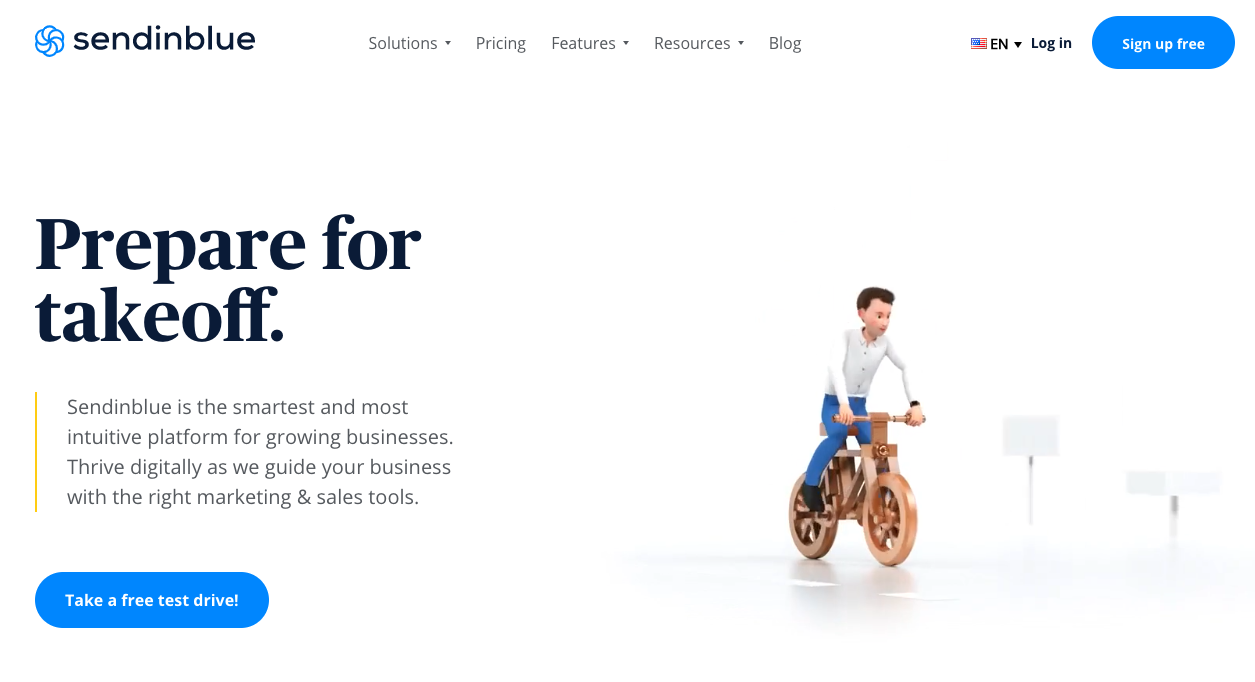
Great for both beginner and advanced marketers, Sendinblue offers an array of tools for both B2B and B2C businesses.
Some of them include an email builder and campaign manager, email campaign automation based on customer behaviour, send time optimization for scheduled drip campaigns, tools to engage and retarget customers on Facebook and across platforms, and automated SMS to communicate directly with customers.
#3. HubSpot
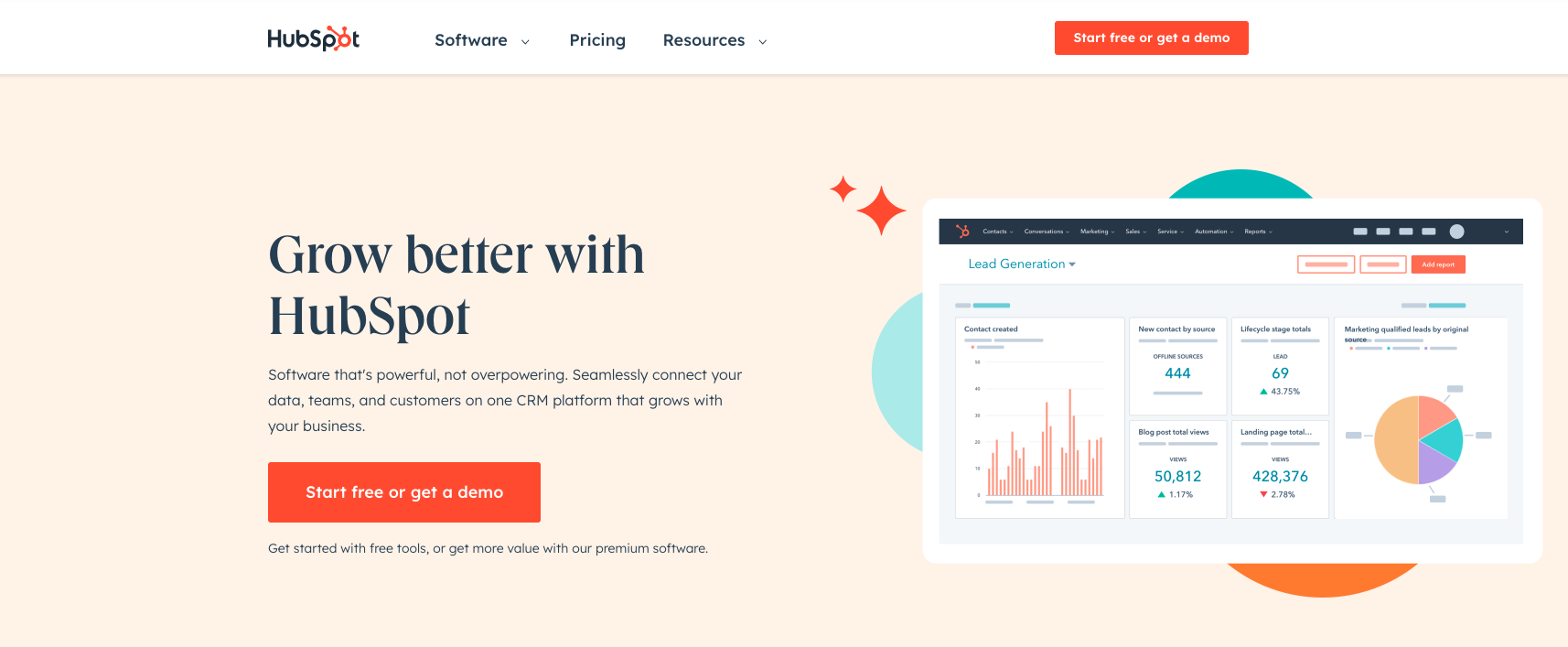
HubSpot is a full-stack marketing automation software that has a built-in CRM. HubSpot features include email marketing, lead generation, analytics, SEO, social media and more. With HubSpot, you can conduct and monitor marketing campaigns, build and manage websites and optimise content for SEO.
Using a CRM and web analytics to inform your marketing strategy, you can create highly targeted ad campaigns and bring in more leads. What’s more, HubSpot tools can be configured to automate workflows across products to manage all qualified leads in one place, making them accessible to teams across departments.
#4. ActiveCampaign
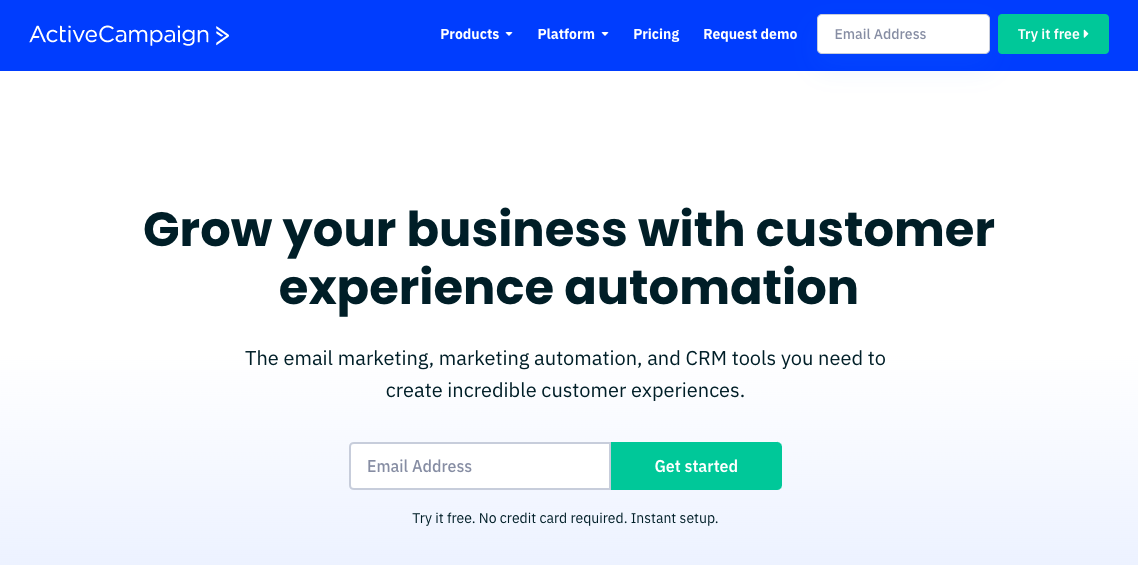
ActiveCampaign is both a CRM and marketing automation platform that works across channels and offers sales tools that integrate with apps like WordPress and Salesforce.
With machine learning built-in, their tools enable you to do tasks ranging from creating dynamic content and advanced reporting to email marketing and segmentation. With ActiveCampaign, you can create eye-catching email campaigns using subject line generators, webinar templates to increase customer engagement and cart abandonment calculators.
#5. Marketo Engage
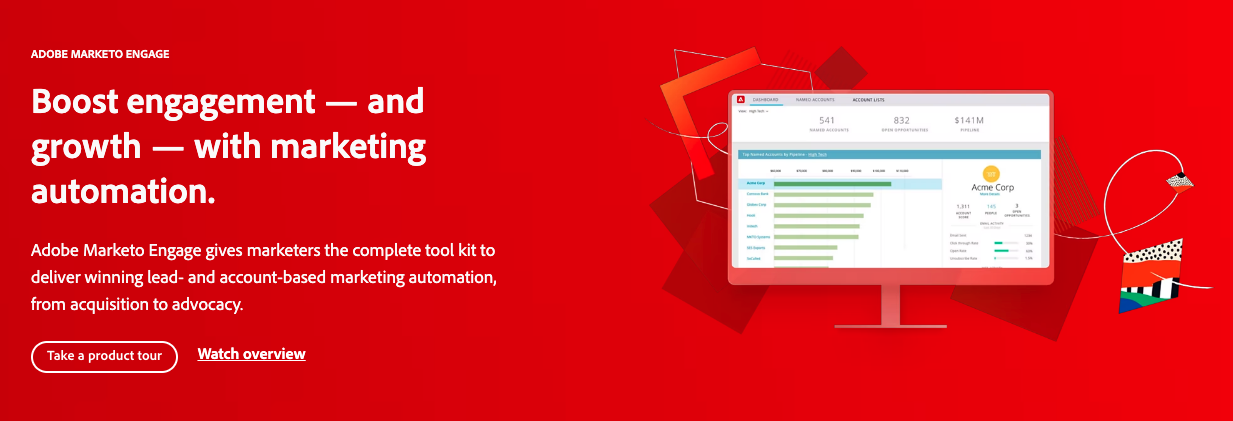
One of the most well known marketing tools, Marketo Engage, is Adobe’s Software-as-a-Service software (SaaS) that automates and measures marketing engagement, tasks and workflows.
With a ton of different integrations, Marketo Engage offers tools to automate lead nurturing and lead scoring, build and scale campaigns, automate email marketing, personalise your website and a lot more. You can even use their tools to determine how your marketing campaigns have been affecting your revenue.
How to Choose the Right Marketing Automation Software for Your Agency
Firstly, you want to find automation tools based on your company’s needs and overall goals. Ask yourself: How could automating certain tasks benefit your strategy?
As marketing automation platforms offer different features, make sure the one you choose integrates well with your existing technology. Many marketing automation platforms offer a free demo so that you can decide if it is right for you.
Value for money is another critical factor: choosing marketing automation software that won’t break the bank while also serving your needs long-term is a delicate balancing act.
If a deal sounds too good to be true, sadly, it probably is, as some platforms advertise low-cost solutions but have hidden fees and revised rates after the trial period ends. You should also consider scalability, so your solutions will grow as your business does.
Eventually, if you find that no tool fits your business requirements, you can turn to bespoke software solutions that will cater to the needs of your agency instead of the other way around.

How Does Marketing Automation Affect Customers?
The benefits of marketing automation aren’t just for businesses. In fact, marketing automation improves customer satisfaction as it provides a personalised experience that is altogether easier for customers to navigate through.
Understanding your customers’ history is central to marketing success. By using automation tools, you can track consumer behaviour to tailor your services to your customers’ needs.
This ensures experiences across channels (with targeted emails or social media engagement) are truly relevant to customers, wherever they are in their customer journey.
Moreover, since marketing automation helps businesses prioritise tasks and manage leads, you can answer customer queries faster with appropriate, personalised support.
Why Can Marketing Automation Fail?
Some companies struggle with implementing marketing automation. However, if you know about the challenges, you can avoid them more easily.
The power of marketing automation software is undeniable, but it’s just a tool, not a magic wand that can generate marketing strategies for you. Remember that these tools work best when used to improve existing processes.
Successful marketing automation relies on your marketing strategy’s clarity, so it’s important to set reasonable goals and consider which automation tools will help you reach them.
Many assume that implementing automation will transform your strategy overnight, underestimating the complexity and work involved. Like any significant change, it takes time but promises real long-term results. Be patient, put in the work, and approach it as an ongoing process—it will pay off big time!
Lastly, communication silos often cause problems during implementation, so proper onboarding and training, as well as involving employees across departments, are essential. Involving salespeople, for example, will give you insight into how marketing automation could most positively impact sales.

Marketing Automation Tips and Best Practices
Marketing automation has proven to transform marketing efforts and can position you at the top of your game. Here are 4 of the best practices to guarantee maximum growth:
#1. Understand Your Audience
Just like any marketing strategy, you need to know your audience to target them in a meaningful way. Tracking and analysing characteristics like behaviour, demographics, profile and interests can be used to learn what your customers want and what needs to be done to move them towards a purchase.
Understanding your audience will help you come up with buyer personas, create personalised automated campaigns and map out marketing strategies. You can also use segmentation to ensure you send relevant targeted content and avoid generic messaging.
#2. Create a Personalised Journey
At the end of the day, the success of marketing automation relies on customer satisfaction, so, of course, you will want automation tools that are genuinely helpful in providing a better experience for them.
To understand where automation can be beneficial, create a customer journey map that identifies all the touchpoints a customer goes through on their journey. Creating a personalised journey will not only improve the customer experience but will also help you understand where and when to target them with the right message at the right time.
#3. Use Lead Scoring
As the leads begin to come in, it’s important to have a lead scoring system in place. This will help you identify which leads need nurturing and which can be passed onto sales, understand how your content is engaging with customers and identify where customers are in the sales funnel for better targeted automated campaigns.
#4. Test Different Strategies
As a marketer, you know that understanding what’s working and what isn’t is part and parcel of developing innovative marketing strategies. Likewise, it’s important to test different strategies when implementing marketing automation in your company.
With automation, you can make quick adjustments to your marketing content by using A/B testing, which provides real-time data about the impact of variations of your content.
Level Up Your Marketing Campaigns with Acuto
In a data-driven world, marketing automation is essential for every marketing agency to stay ahead of the game.
By now, you should feel confident in how marketing automation can help your agency. If you are ready to take the leap but don’t know where to start, Acuto can help you.
As a team of developers and cloud engineers with hands-on marketing experience, we specialise in building automation scripts and bespoke software specific to your unique strategy and needs.
We believe every agency is unique, so every solution should be too. Our automation scripts and bespoke solutions are therefore highly tailored to your agency’s needs.
Our custom scripts can automate those click-intensive tasks, streamline workflows, and boost ad campaigns. And if you require marketing automation at an agency-wide level that can scale across all your accounts, we can build a bespoke software solution for you that you will get to own.
Get in touch today to find out what we can do for you.
Key Takeaways
And that wraps up our guide to getting started with marketing automation. Marketing strategies can be automated in many different ways using a variety of tools, and we hope this guide helps you take your first steps toward automating parts of your marketing. Let’s recap what we covered:
- Marketing automation is streamlining workflows and automating repetitive tasks in marketing strategies, such as automating email marketing, social media posts and PPC campaigns.
- B2B marketing automation focuses on generating leads, whereas B2C marketing automation focuses on the customer journey.
- 5 common types of marketing automation tools are CRM, social media management, email automation, marketing analytics and lead generation software.
- The top 5 Marketing platforms are MailChimp, HubSpot, Sendinblue, ActiveCampaign and Marketo Engage.
- Customers also benefit from marketing automation by gaining a more personalised and seamless customer experience which is far easier to navigate through.
- For marketing automation success, you must understand your target audience, create a personalised customer journey and test different strategies.
Marketing Automation FAQ
#1. What is marketing automation software?
Marketing automation software is a set of tools that automate-time consuming but necessary marketing tasks to streamline your marketing strategy.
#2. How can marketing automation help my agency?
Marketing automation will save you time, improve your audience targeting, allow you to focus on higher-level tasks, enable more consistent branding, facilitate cross departmental collaboration, and more.
#3. What are examples of marketing automation?
Five common types of marketing automation software are CRM, social media management, email marketing automation, marketing analytics, and lead generation tools.
#4. How do I choose the best marketing automation tool?
It’s important to choose a tool that will integrate well with your current marketing strategy. You should also consider tools based on value for money vs. long-term investment.
#5. What’s the difference between CRM and marketing automation?
Generally speaking, marketing automation is primarily used for lead generation and nurturing, while CRM is mostly used for sales.
#6. When should you invest in marketing automation?
If you want to expand your business and streamline your strategy, then you are ready for marketing automation.
